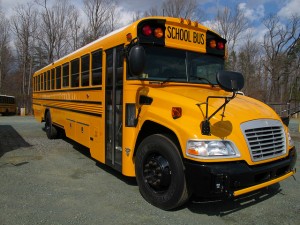 A school district wants to require a charter school to provide bus service to students who live more than two miles away.
A school district wants to require a charter school to provide bus service to students who live more than two miles away.
The school contends the requirement is illegal, buses would put a strain on its budget, and it’s already over-subscribed without busing its students.
That’s the essence of a legal dispute in St. Lucie County, which has gone on for months and is now poised for a decision by an administrative law judge.
This week, lawyers for the school district and the Renaissance Charter School at Tradition filed proposed rulings that shed new light on the case.
The school is operated by Charter Schools USA, which operates nearly 50 schools in Florida and has opened nearly a dozen schools since Tradition submitted its application to the St. Lucie school board in 2012.
“No other school board in the State of Florida requires charier schools to bus all students who live more than two miles from the school,” the school’s lawyers write in their proposed order. The district’s requirement, they contend, “is an illegal, unadopted rule.”
State law says transportation should not be a barrier for parents who want to attend charter schools.
The lawyers for the school, however, write that charters have flexibility to work out how that barrier should be overcome. They note the state’s new standard charter school contract allows districts and charters to negotiate their transportation plans, but does not dictate what those plans must be.
Renaissance provides bus service at some of its schools around the state, but others meet the transportation requirement through other means. Schools like Tradition help parents arrange carpools.
Lawyers for the school district cite testimony from parents who withdrew their children from the school or decided not to attend after learning that bus service would not be available. That testimony, they argue, shows the lack of bus service presents a “barrier to equal access to all students who wish to attend Renaissance at Tradition but whose parents cannot provide their own transportation.”
The charter school’s lawyers, however, write that charters get about two-thirds as much funding as district schools receive. State transportation funding would not cover the full cost of bus service, which means mandatory busing could force the school to make cuts in other areas, like classroom technology.
The district, they write, does not provide transportation to some students who attend its magnet schools, though the district’s lawyers note its “no transportation zones” and “limited transportation zones” cover remote parts of the county where hardly any students live.
Charter schools are required to provide transportation to their students, the district argues, and “relying on parents for required student transportation is only allowed in limited circumstances (where the student is disabled or geographically isolated).”
The case is awaiting a ruling by an administrative law judge, which could come at any time.



Failure to provide transportation is a back-handed way of excluding low-income students who do not have the means (or the 2-parent households) that allow for daily student pick-up and drop-off. It is a borderline income test as admission criteria.
The question, though, is how you help families overcome that barrier. Does it make sense to force every charter school to provide busing it can’t afford, or should schools have more flexibility? Or should districts provide transportation to all public schools, charter and otherwise, in hopes of creating a better economy of scale?
Nobody really disagrees that all students should have transportation (I don’t think). The question is, what’ the most viable way to ensure they get it, and who has the power to decide?
Further, the Renaissance School of SLC, although it offers limited bus routes to students, the fleet A&S Transportation, is NOT providing air conditioning in their buses. Only 2 buses out of 8 have AC. The internal temperatures inside the bus is well over 110 degrees in the afternoons. There is no fan. And when it rains, I was told that the windows will need to be shut. So even though they are providing the transportation, they are not equipping their fleet with AC, whereby limiting the amount of bus riders. Also, my daughter has an upper respiratory condition, and they have been informed, but the A&S Transportation Operation’s Manager, and the school’s principal, but no one wants to do anything about it. Not sure where to go, or whom to contact to make sure that there is regulation that controls the safety of our children rising the school buses in South Florida. I believe that the School District for St Lucie County should regulate the school busing of students in and for St. Lucie County and not leave it up to the charter school. Someone needs to regulate this and all buses should have the air conditioning in the buses. These buses are transporting children and they need to be able to breathe in the buses, but the extreme temperatures will make it that very difficult and it poses a health hazard to the students. No one wants to address this issue. What can I do about this?